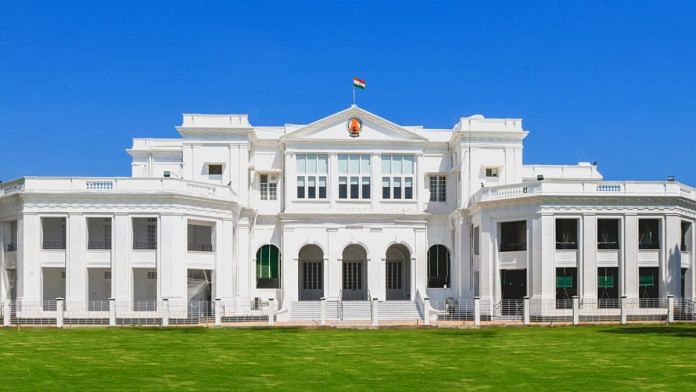A pattern of interferences
But into this rampant politicisation of the governor’s post has now stepped a stern Supreme Court. On 8 April, in a stinging judgment delivered by a two-judge bench, Justices JB Pardiwala and R Mahadevan came down heavily on Tamil Nadu Governor RN Ravi for misuse of powers. The apex court held that the way the Tamil Nadu Governor was withholding his assent to bills was illegal and unconstitutional. The court affirmed that the Governor acted in bad faith and emphasised that he should not have sat on 10 urgent bills passed by the state assembly. Importantly, the court laid down time-bound guidelines for the Raj Bhavans, designed as ceremonial offices by the Constitution, to act on bills passed by the elected state government.
Governor RN Ravi and the MK Stalin-led DMK government in Tamil Nadu have been in a prolonged stand-off because of Ravi’s egregious behaviour and his zeal to meddle in the state’s governance. The Supreme Court has acted in a timely and wise manner to curb a misuse of high office and deserves the thanks of every right-thinking citizen.
In the normal course, such a sharp rebuke by the country’s highest court would have led to the sacking or the resignation of the imperious and meddlesome Tamil Nadu Governor, who has been a serial offender in attempting to interfere with the state government’s work. But then these are not normal times. Today, no constitutional functionary accepts moral responsibility and nobly offers his or her papers for proven acts of commission and omission. No minister in the Modi government has ever offered to resign even after major calamities. In RN Ravi’s case, he has been indicted by the top court. Yet he has dug his heels in and refused to budge from his post.
RN Ravi is by no means alone in the list of “politically active” governors. Across Opposition-ruled states, governors are meddling in the working of elected governments. In West Bengal, the occupant of the Raj Bhavan, CV Ananda Bose spares no opportunity to target the Mamata Banerjee–led government.
Bose has a penchant for undertaking so-called field trips and compiling field reports with a single-minded partisan agenda. Recently, after the unrest in Murshidabad, Bose, against the Chief Minister’s advice, made it a point to visit violence-hit areas. He divested himself of some colourful vocabulary about the events there, even though calm has returned to Murshidabad. In 2023, Bose had made a similarly busybodying visit to Cooch Behar district, which had witnessed violence ahead of panchayat polls.
The same pattern of intense gubernatorial interference prevails in Kerala. So zealous was former Governor Arif Mohammad Khan in opposing the Left Front–ruled government, and so reluctant was he to assent to bills, that the Kerala government moved the Supreme Court against him.
But the Modi-led Centre was clearly highly pleased by Khan’s efforts. He has now been rewarded with the governorship of Bihar, which goes to polls later this year. Khan passed the loyalty test with such flying colours that Modi transferred him to an election-bound state.
The former Telangana Governor, Tamilisai Soundararajan, was regularly on a collision course with the state government, which, too, approached the Supreme Court against her refusal to assent to bills.
In Maharashtra, former governor BS Koshyari was upbraided by the Supreme Court because of the way he virtually participated in the toppling of the Maha Vikas Aghadi government in 2022. The SC in its order said that the Governor did not act in accordance with the law.
Such illegal actions by governors wreak havoc with the constitutional parameters within which they are supposed to function.
Mention may also be made here of the Delhi Lieutenant Governor, VK Saxena. He is a veritable raging bull against the Aam Aadmi Party who did not leave a stone unturned in blocking the Arvind Kejriwal administration, but has since lapsed into meek passivity now that the BJP has taken the reins of Delhi.
Also read: Why Nishikant Dubey won’t be worried about JP Nadda disowning his attack on CJI Khanna and SC
Few checks on power
In this situation of governors actively stymying the daily governance functions of Opposition-ruled states, the Supreme Court’s 8 April judgment is highly salutary. It was urgently needed that the court step in and ensure that governors are reminded of the limits of their powers. But strangely enough, the ruling BJP establishment, instead of co-operating with the court and acting on its wisdom, has chosen to go the other way, turn belligerent and yell about ‘judicial overreach’. In highly dangerous statements, BJP leaders are openly targeting the Supreme Court and its judges.
The BJP leadership may have distanced itself from such remarks, but there are suspicions that certain BJP repeat offender motormouths feel emboldened to speak because they feel protected by most of the party.
The truth is that the Modi government does not want to recognise or accept any limits on untrammelled executive power. Today, national politics is so heavily personalised and the so-called “Modi cult” is such a 24*7 mainstream media-powered bludgeoning force that there are few institutional checks on executive authority. The fact that Modi’s BJP is not a majority on its own does not seem to matter. A powerful enough personality cult seems to bring license to wreak havoc on democratic norms.
Yet without these norms, these constitutional checks and balances, democracy cannot survive. The Constitution upholds the principle of balance of powers of the three arms of government and checks on each organ, yet the Modi-led BJP wants to upset this constitutional balance and seek absolute power.
This is the reason why, instead of acting in the spirit of the SC judgment and asking the Tamil Nadu Governor to step down, the BJP has chosen to target the judiciary when it is hearing important cases like petitions against the Waqf (Amendment) Act, 2025.
The BJP is accustomed to justifying its actions by harking back to the rule of Indira Gandhi when then-Andhra Pradesh Governor Thakur Ram Lal dismissed the Telugu Desam government of NT Rama Rao in 1984. But this is falling into the whataboutery trap and simply repeating the sins of the past.
The BJP keeps castigating the Congress yet is in the strange habit of blindly imitating the Congress of the 1970s and 80s and taking the Congress’ mistakes to brazenly maximalist heights.
Today, governors are acting as extensions of the BJP, refusing to co-operate with opposition governments and attempting to undermine elected chief ministers.
Ensconced in opulent palatial residence, surrounded by well-watered lawns paid for by the taxpayers, today’s governors are subverting the will of the people. In these circumstances, the question must be asked: does India need Raj Bhavans and governors anymore? The short answer is no. India does not need governors anymore. No more Raj Bhavans, please.
Sagarika Ghose is a Rajya Sabha MP, All India Trinamool Congress. She tweets @sagarikaghose. Views are personal.
(Edited by Aamaan Alam Khan)
var ytflag = 0;
var myListener = function() {
document.removeEventListener(‘mousemove’, myListener, false);
lazyloadmyframes();
};
document.addEventListener(‘mousemove’, myListener, false);
window.addEventListener(‘scroll’, function() {
if (ytflag == 0) {
lazyloadmyframes();
ytflag = 1;
}
});
function lazyloadmyframes() {
var ytv = document.getElementsByClassName(“klazyiframe”);
for (var i = 0; i < ytv.length; i++) {
ytv[i].src = ytv[i].getAttribute('data-src');
}
}








